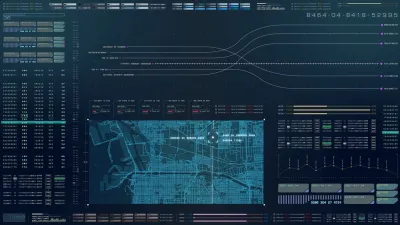Experts from Forbes compiled a list of technologies they say will have the greatest impact on urban living, and several of them will have major impacts on urban planning practice.

In a recent Forbes article, experts on its Technology Council pulled together a list of smart city technologies they say will transform urban living in the not-so-distant future. “Advances in managing everything from transportation to waste management promise to have a significant impact on residents and businesses, improving everyone’s overall quality of life,” the article reads.
Of the 19 trends identified, here are the 12 that have the most relevance to urban planners and related professionals:
- Autonomous vehicles “will transform mobility.”
- “Cognitive cities” technology powered by AI will make “concepts such as ‘smart cities as a service’ a reality.”
- Geolocation data will help cities enhance services for taxpayers and allow for better resource planning for businesses.
- “Context aware” computing that uses AI to build upon the Internet of Things will allow smart cities ”to be able to react more quickly and accurately to user needs and intents.”
- Air taxis have the potential to support urban development, reduce traffic congestion, and drastically reduce the delivery of emergency and medical supplies.
- AI-powered public transit will allow for “dynamically adjusting routes and schedules based on real-time data to minimize wait times and maximize efficiency.”
- Flexible workplaces and “pilot labs” may fill some of vacant commercial spaces cities are currently struggling with.
- Intelligent waste management will “monitor waste levels, optimize collection routes and enhance recycling. This reduces fuel consumption, lowers carbon emissions and minimizes landfill use.”
- Automated public transit payment systems will increase convenience of public transit for users.
- Intelligent traffic management systems will “use real-time data and advanced technology to improve traffic flows, reduce congestion and make public transportation more efficient.”
- Smart parking systems will “use sensors, cameras and data analytics to provide real-time information on parking space availability,” allowing drivers to “use mobile apps to find and reserve available parking spots, reducing the time spent searching for parking and decreasing traffic congestion.”
- Micro-mobility hubs will integrate electric bikes, scooters and car-sharing options, all accessible via a unified digital platform.
For the full list of 19 trends, check out the original Forbes article linked below.
FULL STORY: 19 Smart City Technologies And How They’ll Transform Urban Living

Planetizen Federal Action Tracker
A weekly monitor of how Trump’s orders and actions are impacting planners and planning in America.

Vehicle-related Deaths Drop 29% in Richmond, VA
The seventh year of the city's Vision Zero strategy also cut the number of people killed in alcohol-related crashes by half.

As Trump Phases Out FEMA, Is It Time to Flee the Floodplains?
With less federal funding available for disaster relief efforts, the need to relocate at-risk communities is more urgent than ever.

Berkeley Approves ‘Middle Housing’ Ordinance
The city that invented single-family zoning is finally reckoning with its history of exclusion.

SEPTA Budget Slashes Service by 45 Percent
The Philadelphia-area transit agency is legally tasked with maintaining a balanced budget. Officials hope the state will come to the rescue with additional funding.

Connecticut Governor Vetoes Housing Bill
Gov. Lamont reversed his view on a controversial affordable housing bill that would have required municipalities to zone for set amounts of affordable housing to receive state funding.
Urban Design for Planners 1: Software Tools
This six-course series explores essential urban design concepts using open source software and equips planners with the tools they need to participate fully in the urban design process.
Planning for Universal Design
Learn the tools for implementing Universal Design in planning regulations.
Heyer Gruel & Associates PA
JM Goldson LLC
Custer County Colorado
City of Camden Redevelopment Agency
City of Astoria
Transportation Research & Education Center (TREC) at Portland State University
Camden Redevelopment Agency
City of Claremont
Municipality of Princeton (NJ)





























